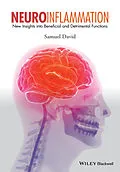Neuroinflammation has long been studied for its connection to the development and progression of Multiple Sclerosis. In recent years, the field has expanded to look at the role of inflammatory processes in a wide range of neurological conditions and cognitive disorders including stroke, amyotrophic lateral sclerosis, and autism. Researchers have also started to note the beneficial impacts of neuroinflammation in certain diseases.
Neuroinflammation: New Insights into Beneficial and Detrimental Functions provides a comprehensive view of both the detriments and benefits of neuroinflammation in human health.
Neuroinflammation: New Insights into Beneficial and Detrimental Functions opens with two chapters that look at some fundamental aspects of neuroinflammation in humans and rodents. The remainder of the book is divided into two sections which examine both the detrimental and beneficial aspects of inflammation on the brain, spinal cord and peripheral nerves, on various disease states, and in normal aging. These sections provide a broad picture of the role neuroinflammation plays in the physiology and pathology of various neurological disorders.
Providing cross-disciplinary coverage, Neuroinflammation: New Insights into Beneficial and Detrimental Functions will be an essential volume for neuroimmunologists, neurobiologists, neurologists, and others interested in the field.
Autorentext
Samuel David is a Professor at the Centre for Research in Neuroscience at The Research Institute of the McGill University Health Centre in Montreal, Quebec, Canada.
Inhalt
List of Contributors xi
Preface xvii
PART I Introduction 1
1 Immune Response in the Human Central Nervous System in Multiple Sclerosis and Stroke 3
Hans Lassmann
Introduction 3
The Concept of Neuroinflammation 3
Basic Principles of Immune Surveillance and Inflammation by Adaptive Immune Responses 4
Inflammation in the Central Nervous System of Patients with Multiple Sclerosis 7
Inflammation in Stroke Lesions 11
Microglia Activation and Macrophage Response 12
Granulocyte Infiltration 12
Conclusions 15
References 15
2 In Vivo Imaging of Glial and Immune Cell Responses in Central Nervous System Injury and Disease 21
Alexandre Paré and Steve Lacroix
Introduction 21
Intravital Microscopy in the CNS and Its Challenges 22
In Vivo Imaging of the CNS Following Sterile Injury 24
In Vivo Imaging of the CNS in Disorders with an Inflammatory Component 27
Conclusion 32
Acknowledgments 33
References 33
PART II Detrimental Aspects of Inflammation 39
3 Roles of CD4 and CD8 T Lymphocytes in Multiple Sclerosis and Experimental Autoimmune Encephalomyelitis 41
Nathalie Arbour and Alexandre Prat
Introduction 41
T Lymphocytes: Central Immune Cells 42
Autoreactive T Lymphocytes 42
From Peripheral Activation to CNS Extravasation 45
Role of CD4 T Lymphocytes in MS and EAE: Th1 versus Th17 46
Role of CD8 T Lymphocytes in MS and EAE 47
Regulatory T Lymphocytes in MS and EAE 48
Conclusions 49
Acknowledgements 49
References 49
4 Microglia and Macrophage Responses and Their Role after Spinal Cord Injury 53
Antje Kroner, Andrew D. Greenhalgh, and Samuel David
Introduction 53
Microglial Responses to Injury 54
Interactions between Microglia and Other Cell Types in Signaling Responses to Injury 57
Entry of Peripheral Macrophages and Differences with Microglia 59
Diverse Roles of Macrophages/Microglia in CNS Injury and Disease 60
Macrophage Polarization in SCI 61
Concluding Remarks 66
Acknowledgements 66
References 66
5 The Complexity of the Innate Immune System Activation in Stroke Pathogenesis 71
María Isabel Cuartero, Ignacio Lizasoain, María Ángeles Moro, and Ivan Ballesteros
Activation of the Brain Innate Immunity After Stroke 71
Myeloid Heterogeneity in Brain Ischemia 76
Concluding Remarks 81
References 81
6 Neuroinflammation in Aging 87
Ashley M. Fenn, Diana M. Norden, and Jonathan P. Godbout Increased CNS Inflammation in Response to Immune Challenge is Adaptive and Beneficial 87
The CNS Microenvironment Shifts to a Proinflammatory State with Aging 88
Microglial Priming 88
Microglial Regulation 90
Immune Reactivity of Glia Contributes to Cognitive and Behavioral Deficits 97
Conclusions 100
References 100
7 Peripheral and Central Immune Mechanisms in Neuropathic Pain 107
Ji Zhang
Introduction 107
Inflammation in Neuropathic Pain 108
Contribution of Peripheral Immune Cells to the Pathogenesis of Neuropathic Pain 109
Critical Roles of Spinal Glial Activation in Neuropathic Pain 111
Significance of Neural Barriers in Inflammatory Response along Pain Transmission Pathway 114
Imbalance of Pro- and Anti-inflammatory Responses in Neuropathic Pain 115
Challenges in Translating Anti-inflammatory Therapeutic Strategies for the Relief of Neuropathic Pain 115
Acknowledgement 117
References 117
8 Inflammation in the Pathogenesis of Inherited Peripheral Neuropathies 123
Janos Groh, Dennis Klein, Antje Kroner, and Rudolf Martini
Inherited Peripheral Neuropathies 123
Subtype-Specific Molecular Patterns of CMT1 124
Molecular Commonalities of CMT1 Subtypes-a Link to Inflammation 125
The Impact of Innate Immune Reactions in Mouse Models of CMT1 126
The Impact of Adaptive Immune Reactions in Mouse Models of CMT1 129
Implications for Putative Therapeutic Approaches 130
Synopsis 132
Acknowledgements 132
References 133
9 Obesity- and Neuroinflammation-Associated Mood and Cognitive Disorders 139
Nathalie Castanon, Giamal Luheshi, and Sophie Layé
Introduction 139
Neuropsychiatric Comorbidity in Obesity 140
Animal Models of Obesity and MetS 140
Mechanisms Underlying the Association between Obesity/MetS and Neuropsychiatric Symptoms 142
Neuroinflammation, Sickness Behavior, and Neuropsychiatric Symptoms 143
Role of Neuroinflammation in Neuropsychiatric Symptoms Associated with Obesity and MetS 146
Conclusions 148
References 149
10 Viral Infections of the Central Nervous System: Pathogenic and Protective Effects of Neuroinflammation 155
John G. Walsh and Christopher Power
Introduction 155
Nervous System Infection and Inflammation 157
HIV-1 Infection: Neurological and Neuropathological Features 158
WNV Infection and Neuropathology 162
Future Perspectives 166
References 167
PART III Beneficial Aspects of Inflammation 173
11 The Interplay between the Peripheral and Local Immune Response in Recovery from Acute Central Nervous System Injuries 175
Catarina Raposo and Michal Schwartz
Paradigm of Protective Autoimmunity 175
Dichotomy between Microglia and Infiltrating Monocyte-Derived Macrophages 176
Infiltrating Macrophages Promote Inflammation Resolution and Axonal Regeneration 177
The Two Faces of Tregs in CNS Repair 178
Protective Autoimmunity Works at the Specialized Choroid Plexus Gate 179
Inflammation, the Old Villain in Spinal Cord Repair 181
Comprehensive View of the Protective Autoimmune Network: the Link between Autoimmune T Cells and Inflammation-Resolving Cells 181
Acknowledgments 183
R…
